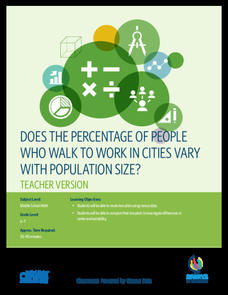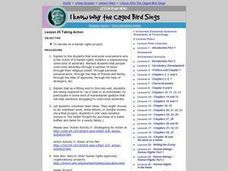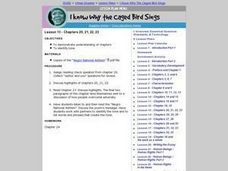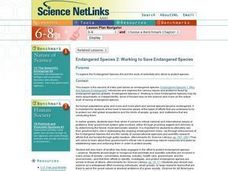iCivics
Mini-Lesson: Gerrymandering
Who determines the structure of voting districts? The concept of gerrymandering brings to light the ongoing issue of how those running for office gain votes. Hands-on activities enable scholars to analyze the re-drawing of voting...
Curated OER
Why do People Migrate?
Second graders examine the reasons for human migration. In this human migration lesson plan, 2nd graders make lists of reasons why people migrate. Students view pictures of people who have migrated and discuss why. Then the students...
Goodwill Community Foundation, Inc.
Meeting New People
Find out your conversation partner's name, job, place of origin, and current residence with a straightforward Spanish practice guide. Learners click on audio icons to hear the proper pronunciation of ¿Como te llamas? and ¿De donde eres?...
The New York Times
Literary Pilgrimages: Exploring the Role of Place in Writers’ Lives and Work
Do the places you have lived influence what you write? Class members research the lives of writers and look for how places these writers have lived might have influenced their writings.
US Department of Commerce
Does the Percentage of People Who Walk to Work in Cities Vary with Population Size?
To walk or not to walk? Pupils create box plots comparing the percentage of residents who walk to work in large, medium, and small cities. Using the box plots, class members compare the data that reflects available statistics. Scholars...
Curated OER
I Know Why the Caged Bird Sings: Taking Action
Young scholars create a human rights project based on their lesson with Maya Angelou's I Know Why the Caged Bird Sings. In this human rights lesson, students participate in a humanitarian gesture as volunteers by creating a human rights...
Curated OER
I Know Why the Caged Bird Sings: Human Rights
Students use Maya Angelou's I Know Why the Caged Bird Sings as analysis on human rights. In this human rights lesson, students develop an awareness of human rights issues and explore the Universal Declaration of Human Rights using the...
Curated OER
I Know Why the Caged Bird Sings
Learners identify the use of characterization in Maya Angelou's I Know Why the Caged Bird Sings. In this characterization lesson, students define characterization and write descriptive paragraphs about Maya Angelou's grandmother....
Curated OER
I Know Why the Caged Bird Sings: Chapters 20, 21, 22, 23
Students complete chapter analysis activities for the Maya Angelou's I Know Why the Caged Bird Sings. In this novel analysis lesson, students read and discuss chapters 20, 21, and 22 from the novel. Students then read and listen to the...
Curated OER
Working for the Common Good
Students explore the concept of nation building. In this Peace Corps lesson, students examine primary source documents from corps volunteers in the Dominican Republic to determine what it means to work for the common good.
Curated OER
Heads Up
To celebrate cultural diversity and multicultural awareness, learners explore the nature of headwear used around the world. They brainstorm the types of headwear they've seen, and then discuss why people wear coverings on their heads....
Teach Engineering
Rube Goldberg and the Meaning of Machines
A Rube Goldberg machine does not really look like it would make work easier. Introduce your class to Rube Goldberg with a resource that shows how his inventions make simple tasks harder to complete.
Curated OER
Mission System of Texas
Students create a storybook about Texas missions including the history of why they were built. They research and create pictures depicting how and why the missions were built. They write and illustrate the primary groups of people found...
Curated OER
Social Class Stereotypes
Encourage your students to think about how and why people and categorized in terms of social class. They decide what "class" they belong to, and then brainstorm about the indicators that society uses to define class and to categorize...
State Bar of Texas
White v. Regester
One vote doesn't really matter, right? Class members investigate the concept of voter rights and restrictions using the 1973 Supreme Court case White v. Regester. They view a short video and work in pairs to analyze how people create...
NOAA
Communicate!: Create a Unique Message About Climate Change
Scholars use their communication skills to express their take on climate change in the ninth installment of the 10-part Discover Your Changing World series. They create ways to deliver their messages on a specific aspect of climate by...
Mathematics Assessment Project
“Ponzi” Pyramid Schemes
Use mathematics to show your classes the power of a good model. Young mathematicians analyze the famous Ponzi pyramid scheme using an exponential pattern. They make conclusions on the reliability of the plan and why it is illegal.
US Institute of Peace
Responding to Conflict: Mediation
What happens when two parties can't come to agreement? Scholars explore the role of a mediator through part 10 of a 15-part series of peacebuilding lessons. Through individual work and role play, pupils brainstorm solutions until they...
Curated OER
Antibiotics: Will They Work?
Students examine why antibiotics are important in everyday life. They examine the decisions that people make and how these decisions can artificially speed up natural selection in bacteria that cause infections such as group A...
Curated OER
Working for a Living: Child Labor Laws
Pupils research the working conditions in the late 1800's and the evolution of child labor laws. They discuss how the laws affect them today and if they are fair. They write a paper summarizing the laws and the view of the laws.
Curated OER
Why Vote? A Public Awareness Campaign
Young scholars examine the structure of local government and determine why citizens vote. In this civics instructional activity, students listen to a lecture about the structure of local government and then encourage others to exercise...
Edgate
Why Map a Map?
After brainstorming reasons why Native Americans mapped their lands, your young critical thinkers will work together to review their ideas and determine the definition of a map. With today's extensive use of mapping technology and GPS...
Curated OER
Endangered Species 2: Working to Save Endangered Species
Pupils explore the Endangered Species Act and the work of scientists who strive to protect species.
Blogger
Apple Poster
Science is all about wonder... I wonder what causes the moon phases; I wonder why people get sick. The cross-stitch-style poster pays homage to Sir Issac Newton's curiosity when it came to asking questions about gravity.

























